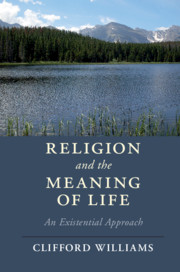Book contents
- Religion and the Meaning of Life
- Cambridge Studies in Religion, Philosophy, and Society
- Religion and the Meaning of Life
- Copyright page
- Contents
- Acknowledgments
- Introduction
- 1 Why Should We Care about Meaning?
- 2 Boredom
- 3 Denial of Death
- 4 Acquiring Meaning
- 5 Suicide
- 6 The Divine One
- 7 Life after Death
- 8 Obstacles
- 9 How Should We Live So as to Die Well?
- Epilogue Facts the Heart Can Feel
- Notes
- References
- Index
3 - Denial of Death
Published online by Cambridge University Press: 23 March 2020
- Religion and the Meaning of Life
- Cambridge Studies in Religion, Philosophy, and Society
- Religion and the Meaning of Life
- Copyright page
- Contents
- Acknowledgments
- Introduction
- 1 Why Should We Care about Meaning?
- 2 Boredom
- 3 Denial of Death
- 4 Acquiring Meaning
- 5 Suicide
- 6 The Divine One
- 7 Life after Death
- 8 Obstacles
- 9 How Should We Live So as to Die Well?
- Epilogue Facts the Heart Can Feel
- Notes
- References
- Index
Summary
Using Ernest Becker’s The Denial of Death, chapter 3 describes “immortality projects” that are commonly used to avoid the terror of death. Immortality projects are activities that we humans regard as endowing cosmic significance and eternal life on us, including both publicly recognized projects and everyday, quotidian undertakings. None of these “one-dimensional” immortality projects work, Becker states. We die despite our efforts to cast ourselves as immortal. The terror of death, however, is so great that we lie to ourselves about the ineffectiveness of our immortality projects. Becker says that these lies are “vital,” given that death with extinction is so terrifying. It is terrifying because we humans desperately need to believe that our lives have lasting meaning. The only true way to deal with the prospect of death, Becker states, is to “die” and be “reborn” by identifying with what he calls “the transcendent.” Chapter 3 describes what is involved in this rebirth.
Keywords
- Type
- Chapter
- Information
- Religion and the Meaning of LifeAn Existential Approach, pp. 42 - 55Publisher: Cambridge University PressPrint publication year: 2020

